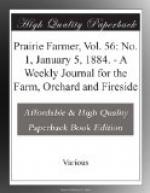Professor S.R. Thompson, Superintendent of the Nebraska Agricultural College farm, has been chosen to represent Nebraska at the meeting to be held at Washington, D.C., next week, for the purpose of taking action in regard to contagious diseases of cattle. He requests stock men and all others interested in the cattle industries of his State to correspond with him, and make such suggestions as they may think proper for guidance at the meeting.
Since its organization in 1853 to 1882 inclusive, the managers of the Illinois State Fair have offered the following amounts in premiums for live stock: Cattle, $70,406; horses and mules, $81,825; sheep, $24,450; swine, $25,320; poultry, $8,214;—total $210,215, which must be considered pretty substantial encouragement. The total offered in premiums for all classes of exhibits has been $303,961. Thus a little more than two thirds of the entire amount has been given to the breeders and importers of stock.
The officers of the Northwestern Dairymen’s Association say that every indication warrants the conclusion that the coming convention at Mankato, Minn., commencing February 12, will prove the grandest success in the history of the association. A full array of the best dairy talent of the entire Northwest will be present. The purpose is both in the arrangement of the programme and in the conduct of the discussions, to make of the coming convention an institute for study and instruction which no intelligent and progressive farmer can afford to miss.
The Missouri State Board of Agriculture asks the aid of one competent man in every township in the State to give it estimates of crops, etc., in his vicinity. The aim is to give as full and reliable statistics for crop reports as it is possible to collect. The State provides but $1,250 for the general expenses of the Board, and it is thus dependent upon voluntary aid in the matter. The Board will defray all expenses of postage and stationery. Competent persons willing to undertake this work for the public good should address J.W. Sanborn, Secretary, Columbus, Mo. Such persons will receive, free, the monthly and annual reports of the Board.
In March of last year Secretary Fisher, of the Illinois State Board of Agriculture, submitted his report for 1882 to Gov. Hamilton. This report has just made its appearance. It has taken the State printer ten months to get the volume printed and bound for distribution, a work that any respectable job office in Chicago would have turned out in four weeks without any extra exertion. The report is valuable, of course, but it would have been worth a deal more had it appeared last April. Such papers as the report of Prof. Forbes, State Entomologist, for instance, might have been of immense benefit to the people of the State if the information it contains regarding noxious insects had reached them in early spring.




